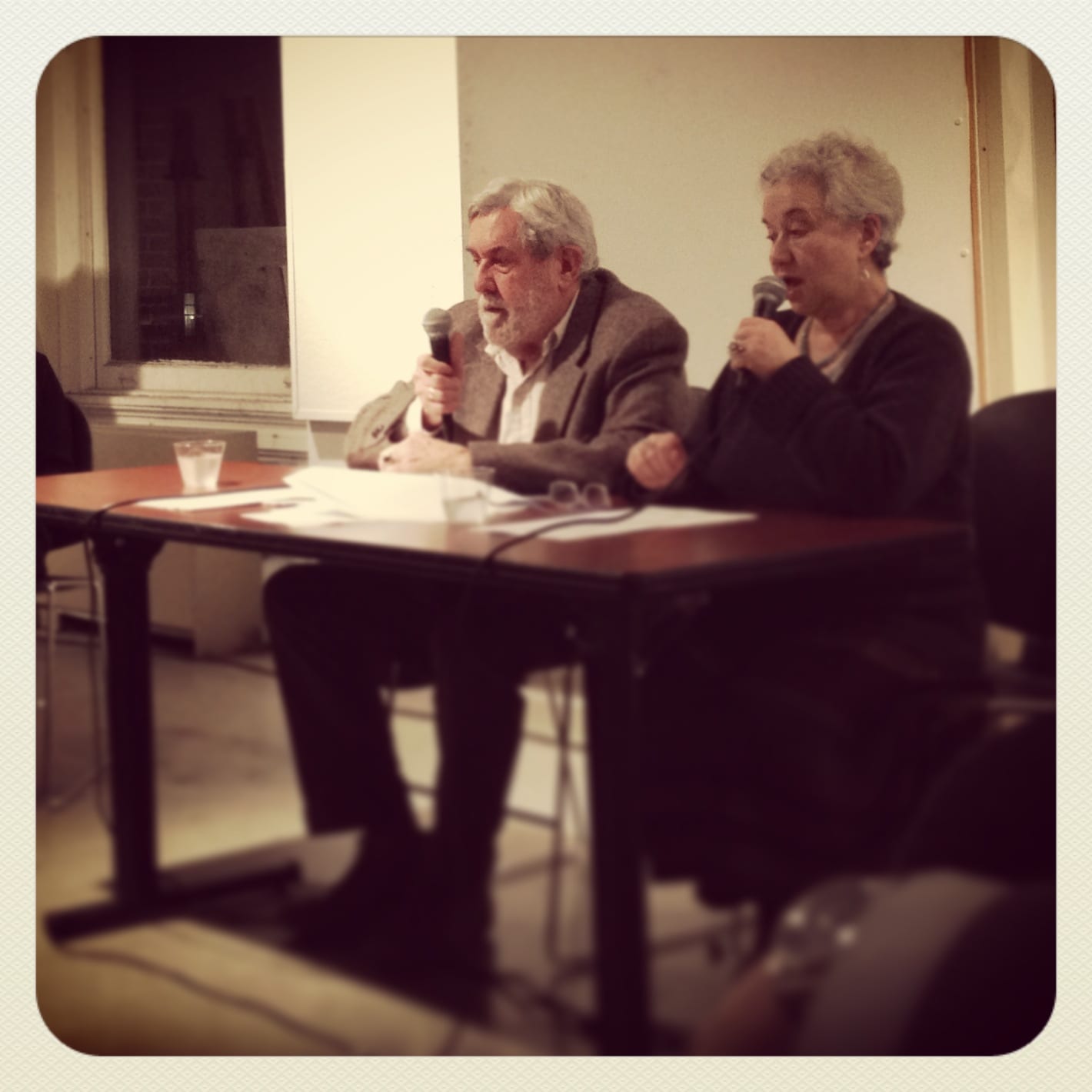
Richard Pevear and Larissa Volokhonsky engaging in some witty banter during the Columbia Graduate Writing Program Translation Lecture on Wednesday, March 12, 2014.
Before I was a nonfiction writer in Columbia’s Graduate Writing Program, I was a student of Russian Language and Literature at Wellesley College. I started taking Russian 101 the fall of my first-year – sick of the Latin I could have used to place out of the language requirement – thinking, “It would be nice to read Chekhov in the original.” I didn’t expect to spend all my undergrad years struggling to translate simple poetry and children’s literature, reading Nabokov, Tolstoy, and Gogol in translation, and living in St. Petersburg for fourteen months. The Wellesley Russian Department became my home: it was intimate, familial. There were only three Russian majors in my graduating class, and many of my closest friends from college also studied Russian, speaking together in a Russk-lish slang outside of class. My non-Russian-major friends even picked up a few words: devushki (ladies) and davai (come on) or poshli (let’s go). The professors in the department too – Thomas Hodge, Alla L’vovna Epsteyn, and Adam Weiner – felt like family. I remember crying to Professor Hodge in his office when I told him I needed to miss class to put down my family’s dog. I spent my days at Wellesley lounging on the Russian Department sofas, drinking tea and eating Russian candy, thinking that if I ever could get the genitive plural straight then maybe I could hack it as a translator. In fact, I decided to come to Columbia because of the Literary Translation at Columbia (LTAC) track that was possible to pursue jointly with an MFA.
But something happened. I fell off the wagon. I started to feel that maybe the LTAC requirements were too similar to the translation classes I had done in undergrad, that I was simply trying to replicate my cozy experience in Wellesley’s Russkaya Kafedra. I decided to use my MFA semesters to branch out and take classes I didn’t take in undergrad: a poetry lecture, a book arts seminar, a class on teaching writing. I was also scared because in the four years since I graduated, my Russian has become painfully rusty.
That didn’t prevent me from arriving with enthusiasm at Columbia’s Graduate Writing Program’s Translation Lecture last Wednesday night featuring Richard Pevear and Larissa Volokhonsky. When I first read Anna Karenina – the translation by the Maude sisters – I fell in love, but when I reread Pevear and Volokhonsky’s version, it was like renewing my wedding vows. The language was fresh and alive and vividly modern. Tolstoy felt like Zadie Smith. I could not wait to hear their insights, and I was not disappointed.
Referring to themselves as “P and V,” Pevear and Volokhonsky have a shtick. One Russian-major-friend refers to them as the “infamous couple.” When they were asked to explain their process, Volokhonsky began with, “Well, you see, we are married…” (pause) “… to each other…” They somehow managed to end the lecture alternating lines of a song, “Don’t need a ticket! Get a stamp… and lick it!” Their translations are clearly born out of love – mutual affection for each other, but also a deep passion for language itself.
Pevear explained that they first began translating when they happened to both be reading Crime and Punishment at the same time – Pevear in English, Volokhonsky in Russian – and they compared sentences and saw how radically different they were. Since then, they have developed a system: Volokhonsky makes the first draft, trying to translate as literally as possible (“But only a phone book or a train schedule can be translated literally,” she said, “Though even Amtrak can be interpreted!” Pevear added), explaining any clichés or colloquialisms. Then Pevear looks at the “scribble” (as Volokhonsky calls it), and he “puts it into English” (Pevear said, sighing). Pevear asks Volokhonsky questions, and, in the creating of the third draft, she answers them. Finally, before sending anything off to their editor, Pevear reads the English version out loud while Volokhonsky follows along in the original Russian text.
Born from this system are translations of the major works of Tolstoy, Dostoevsky, Gogol, Bulgakov, Pasternak, Turgenev, and Chekhov. Pevear encouraged students not to be intimidated by translating something that already exists in translation – chances are you will see something that the earlier translator missed. “Express not word for word,” Pevear added, “but meaning by meaning.” Volokhonsky talked about the challenges in Bulgakov’s The Master and Margarita – how there are two different voices in the writing, one for the modern Moscow plotline and one for the ancient Pontius Pilate plotline – and she read the original Russian and several different translations, explaining the differences of each.
Part of why Pevear and Volokhonsky’s translations feel so contemporary is their faithfulness to the original author’s voice and style. “There is no such thing as a general voice,” said Pevear, and you have to work with “the foreignness given to you by the foreign language.” “Often it’s very important to use the same word,” Volokhonsky said, when you are trying to preserve a certain style or voice. In MFA workshops we are told repetition is bad; I myself have been guilty of circling words on classmates’ manuscripts and saying, “This is redundant!” She read a passage of Anna Karenina in which Anna is described as “enchanting” seven times. Tolstoy intended the building repetition, besides, she added, finding seven synonyms would be hard. Pevear also warned against the dangers of the autocorrect in your own brain – how when you are reading, you “correct” things as you go along and may make “incorrect corrections” – referencing Tim Parks’ essay, “Reading It Wrong.”
“God is in the details!” declared Volokhonsky. “Some say it’s the devil,” Pevear added.
Listening to Volokhonsky read the original Russian snippets of Bulgakov, Pasternak, and Tolstoy, my heart swelled and then broke. It brought me back to my Russian 101 class, when Professor Hodge recited a Pushkin poem and the beauty of the language overwhelmed me. But I was devastated: I could only understand maybe a third of the Russian. At one point Volokhonsky asked, “Does anyone here actually speak Russian?” My MFA friends stared at me, but I sunk lower in my chair. Later, when Pevear read a French translation, I thought I understood about the same amount as the Russian. I felt like a fraud. Not only had my Russian gone to hell, but what had I been reading all those years at Wellesley? I focused on Nabokov’s novels (as he founded the Wellesley Russian Department in the 1940s to a cult following) and lesser-known short stories. How had I never read War and Peace or The Brothers Karamazov? I was supposed to read Crime and Punishment, I knew that, but it came up in the Russian survey course syllabus back-to-back with Anna Karenina and it was a pick one or the other situation. I was a joke.
Still, sheepishly, I approached Pevear and Volokhonsky after the lecture. I thanked them for the talk and admitted, embarrassed, that I speak Russian – though very badly. When Volokhonsky asked me what I was translating right now, I looked at the floor and said I wasn’t working on anything at the moment. “Translating is good for all writers,” Volokhonsky said. I had to agree. I spent so much time this year thinking about the plot structure and themes in my book-length project that I was forgetting what actually makes up writing: paragraphs, sentences, and words. Getting back into translating Russian might be a good idea after all. If anything, it would help me focus on the specifics.
Still, I thought, leaving the lecture that night, I think I’ll start by reading Pevear and Volokhonsky’s translation of Crime and Punishment.
—
P.S. In case you’re planning to write one, you should know that Pevear reads Amazon reviews of their translations. He chuckled at one describing War and Peace as “a book with a novel in it.”
Leave a Comment
You must be logged in to post a comment.


